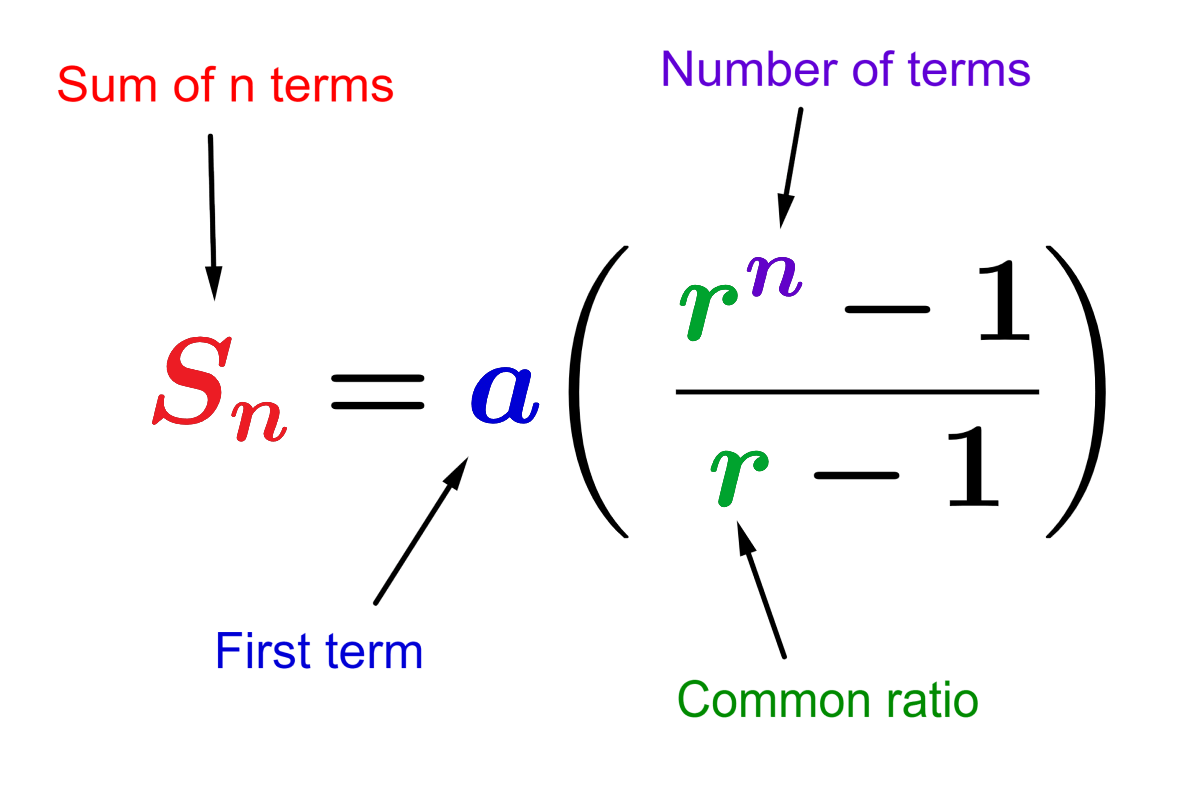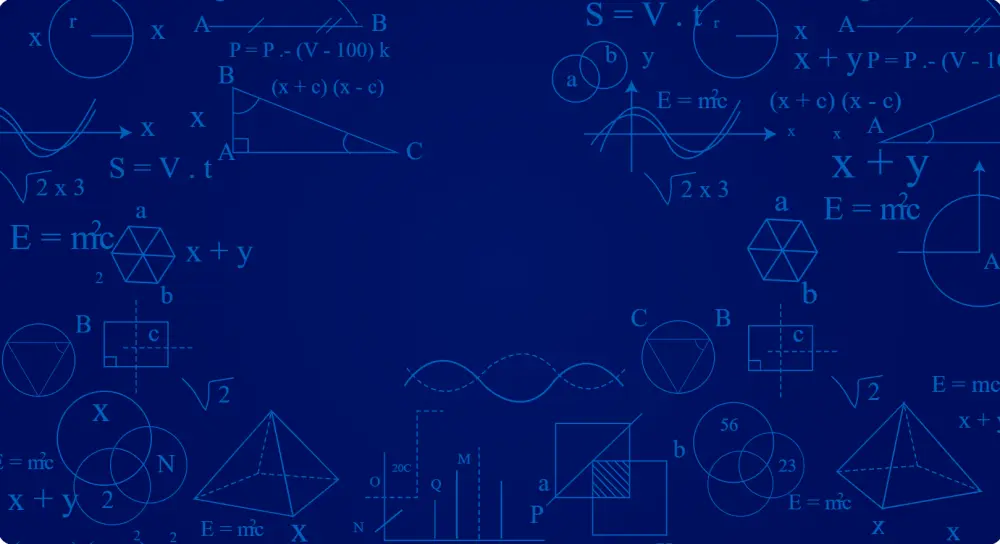The sum of any geometric sequence can be calculated using a standard formula. This formula uses the values of the first term, the common ratio, and the number of terms. There are two variations of this formula that can be applied depending on whether the common ratio is greater than 1 or less than 1.
Here, we will solve some exercises on the sum of geometric sequences. In addition, we will look at some practice problems to apply what you have learned.
Formulas for the sum of a geometric sequence
A geometric sequence is a sequence in which each of its terms is formed by multiplying the previous term by a number called the common ratio.
We can find the sum of the first $latex n$ terms of a geometric sequence using the following formula:
$$S_{n}=a\left( \frac{1-r^n}{1-r}\right)$$
Alternatively, we can write the formula as follows:
$$S_{n}=a\left( \frac{r^n-1}{r-1}\right)$$
where
- $latex a$ is the first term of the sequence.
- $latex r$ is the common ratio.
- $latex n $ is the number of terms.

Proof of the formula for the sum of geometric sequences
Each term of a geometric sequence is obtained by multiplying the previous term by the common ratio $latex r$. Therefore, we can write the following:
$$S_{n}=a+ar+ar^2+…+ar^{n-1}$$
This is equation [1]. If we multiply both sides of the equation by $latex r$, we have:
$$rS_{n}=ar+ar^2+ar^3+…+ar^n$$
This is equation [2]. If we subtract equation [2] from equation [1], we have:
$$S_{n}-rS_{n}=(a+ar+…+ar^{n-1})-(ar+ar^2+…+ar^n)$$
Simplifying, we have:
$$S_{n}(1-r)=a-ar^n$$
$$S_{n}=\frac{a(1-r^n)}{1-r}$$
We can get the alternate version if we multiply both the numerator and denominator of this formula by -1:
$$S_{n}=\frac{a(r^n-1)}{r-1}$$
10 Solved examples of sums of geometric sequences
EXAMPLE 1
What is the sum of the first four terms of a geometric sequence in which the first term is equal to 5 and the common ratio is equal to 2?
Solution
To solve this exercise, we start by writing the information we know:
- First term: $latex a=5$
- Common ratio: $latex r=2$
- Number of terms: $latex n=4$
Now, we can use the formula for the sum of a geometric sequence with the given values:
$$S_{n}=\frac{a(r^n-1)}{r-1}$$
$$S_{4}=\frac{5(2^4-1)}{2-1}$$
$$=\frac{5(16-1)}{1}$$
$$=\frac{5(15)}{1}$$
$$S_{4}=75$$
EXAMPLE 2
If a geometric sequence starts with the term 6 and their common ratio is -2, find the sum of the first 5 terms.
Solution
We start by writing the information we know:
- First term: $latex a=6$
- Common ratio: $latex r=-2$
- Number of terms: $latex n=5$
Applying the formula for the sum of geometric sequences, we have:
$$S_{n}=\frac{a(r^n-1)}{r-1}$$
$$S_{5}=\frac{6((-2)^5-1)}{-2-1}$$
$$=\frac{6(-32-1)}{-3}$$
$$=\frac{6(-33)}{-3}$$
$$=\frac{-198}{-3}$$
$latex S_{5}=66$
EXAMPLE 3
Find the sum of the first four terms of a geometric sequence that has a first term equal to 1 and a common ratio equal to $latex \frac{1}{4}$.
Solution
We have the following values:
- First term: $latex a=1$
- Common ratio: $latex r=\frac{1}{4}$
- Number of terms: $latex n=4$
Applying the formula for the sum of geometric sequences, we have:
$$S_{n}=\frac{a(1-r^n)}{1-r}$$
$$S_{4}=\frac{1(1-(\frac{1}{4})^4)}{1-\frac{1}{4}}$$
We are going to apply the difference of squares to the numerator twice. Then we simplify:
$$S_{4}=\frac{(1-(\frac{1}{4})^2)(1+(\frac{1}{4})^2)}{1-\frac{1}{4}}$$
$$=\frac{(1-\frac{1}{4})(1+\frac{1}{4})(1+(\frac{1}{4})^2)}{1-\frac{1}{4}}$$
$$=\left(1+\frac{1}{4}\right)\left(1+(\frac{1}{4})^2\right)$$
$$=\left(\frac{5}{4}\right)\left(\frac{17}{16}\right)$$
$$S_{4}=\frac{85}{64}$$
EXAMPLE 4
A geometric sequence starts with the terms 3, 6, 12, … Find the sum of the first 10 terms.
Solution
We don’t know the value of the common ratio directly, but we can find it by dividing a term by its previous term. Thus, we have: 6/3=2:
- $latex a=3$
- $latex r=2$
- $latex n=10$
When we use these values into the sum formula, we have:
$$S_{n}=\frac{a(r^n-1)}{r-1}$$
$$S_{10}=\frac{3(2^{10}-1)}{2-1}$$
$$=\frac{3(1024-1)}{1}$$
$latex =3(1023)$
$latex S_{10}=3069$
EXAMPLE 5
Find the sum of the first 8 terms of a geometric sequence that starts with the terms 5, 10, 20, …
Solution
To solve this example, we have to start by finding the common ratio. Then, we have: 10/5=2, so we have the following values:
- $latex a=5$
- $latex r=2$
- $latex n=8$
Now, we use these values in the formula for the sum:
$$S_{n}=\frac{a(r^n-1)}{r-1}$$
$$S_{8}=\frac{5(2^8-1)}{2-1}$$
$$=\frac{5(256-1)}{1}$$
$latex =5(255)$
$latex S_{8}=1275$
EXAMPLE 6
What is the sum of the first 6 terms of the geometric sequence that starts with the terms -2, 8, -32, …?
Solution
Similar to the previous exercises, we start by finding the common ratio. Thus, 8/-2=-4, so we have the following:
- $latex a=-2$
- $latex r=-4$
- $latex n=6$
When we use the formula for the sum of geometric sequences, we have:
$$S_{n}=\frac{a(r^n-1)}{r-1}$$
$$S_{6}=\frac{-2((-4)^6-1)}{-4-1}$$
$$=\frac{-2(4096-1)}{-5}$$
$$=\frac{-2(4095)}{-5}$$
$latex S_{6}=1638$
EXAMPLE 7
Find the sum of the first 7 terms of a geometric sequence starting with the terms $latex 1, ~\frac{1}{3},~\frac{1}{9}$.
Solution
The common ratio of the sequence is $latex \frac{1}{3} \div 1= \frac{1}{3}$. Then, we have the following:
- $latex a=1$
- $latex r=\frac{1}{3}$
- $latex n=7$
Now, we use the formula for the sum in its alternative version, since the common ratio is less than 1, and we have:
$$S_{n}=\frac{a(1-r^n)}{1-r}$$
$$S_{7}=\frac{1(1-(\frac{1}{3})^7}{1-\frac{1}{3}}$$
$$=\frac{(1-\frac{1}{2187})}{\frac{2}{3}}$$
$$=\frac{\frac{2186}{2187}}{\frac{2}{3}}$$
$$=\frac{1093}{729}$$
$latex S_{7}=1~ \frac{364}{729}$
EXAMPLE 8
What is the sum of the following geometric sequence?
$$3+6+12+…+384$$
Solution
In this case, we know the first three terms and the last term. We know neither the common ratio nor the number of terms.
The common ratio is 6/3=2. To find the number of terms, we use the formula for the nth term of a geometric sequence , $latex a_{n}=ar^{n-1}$ and solve for $latex n$:
$latex a_{n}=ar^{n-1}$
$latex 384=(3)(2)^{n-1}$
$latex 128=2^{n-1}$
$$128=\frac{2^n}{2^1}$$
$latex 256=2^n$
$latex n=\log_{2}(256)$
$latex n=8$
Now that we have all the required values, we use the formula for the sum:
$$S_{n}=\frac{a(r^n-1)}{r-1}$$
$$S_{8}=\frac{3(2^8-1)}{2-1}$$
$$=\frac{3(256-1)}{1}$$
$latex =3(255)$
$latex S_{8}=765$
EXAMPLE 9
Find the sum of the following geometric sequence:
$$4-12+36-…-972$$
Solution
Again, we start by finding the common ratio: -12/4=-3.
Now, we use the formula for the nth term of a geometric sequence, $latex a_{n}=ar^{n-1}$ to find the number of terms:
$latex a_{n}=ar^{n-1}$
$latex -972=(4)(-3)^{n-1}$
$latex 243=(-3)^{n-1}$
$$243=\frac{(-3)^n}{(-3)^1}$$
$latex -729=(-3)^n$
$latex n=6$
Applying the formula for the sum with the values found, we have:
$$S_{n}=\frac{a(r^n-1)}{r-1}$$
$$S_{6}=\frac{4((-3)^6-1)}{(-3)-1}$$
$$=\frac{4(729-1)}{-4}$$
$latex S_{6}=-728$
EXAMPLE 10
Find the sum of the following geometric sequence:
$$\frac{1}{4}+\frac{1}{16}+\frac{1}{64}+…+\frac{1}{4096}$$
Solution
We start by finding the common ratio of the sequence: $latex \frac{1}{16}\div \frac{1}{4}=\frac{1}{4}$.
Now, we find the number of terms using the formula $latex a_{n}=ar^{n-1}$:
$latex a_{n}=ar^{n-1}$
$$\frac{1}{4096}=\left(\frac{1}{4}\right)\left(\frac{1}{4}\right)^{n-1}$$
$$\frac{1}{1024}=\left(\frac{1}{4}\right)^{n-1}$$
$$\frac{1}{1024}=\frac{\left(\frac{1}{4}\right)^n}{\left(\frac{1}{4}\right)^1}$$
$latex 4^n=4096$
$latex n=\log_{4}(4096)$
$latex n=6$
Applying the formula for the sum with these values, we have:
$$S_{6}=\frac{\frac{1}{4}\left(1-\left(\frac{1}{4}\right)^6\right)}{1-\frac{1}{4}}$$
$$=\frac{\frac{1}{4}\left(1-\frac{1}{4096}\right)}{\frac{3}{4}}$$
$$=\frac{\frac{1}{4}\left(\frac{4095}{4096}\right)}{\frac{3}{4}}$$
$$S_{6}=\frac{1365}{4096}$$
Sum of geometric sequences – Practice problems


Find the sum of the following geometric sequence $$7-14+28-…+448$$
Write the answer in the input box.
See also
Interested in learning more about geometric sequences? You can look at these pages:



